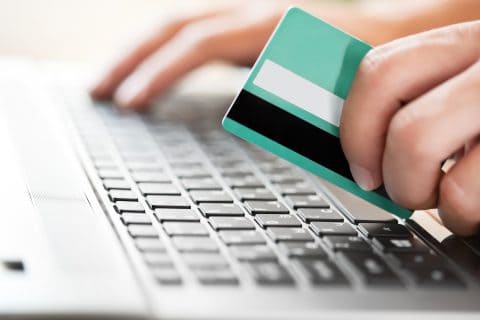Credit vs. Debit: Which Card Should You Use Online?

Avoiding online commerce in 2016 is sort of like avoiding the sun in July, or Kardashians on Twitter. Love it or hate it, at some point you’re going to cross paths with it, and it’s best to be prepared when you do.
For most of us, though, buying online is about as natural as breathing. We do it so often we barely think about it. But any time you spend money it’s worth thinking about, and your different payment methods are processed in very different ways — even if the money is all coming out of the same account.
Where the Money “Comes From”
When you use a debit card, the money goes directly from your bank account to the store you’re purchasing from. There are a lot of times when this is fine, or even useful. If you’re making a purchase that depends on an international exchange rate, having that money go through immediately is best for you. If you’re automatically paying bills and trying to watch your balance carefully, having that money go in and out of your account immediately is also helpful.
When you pay with a credit card, the payment is processed by the credit card company. This usually carries a fee that the person you’re buying from has to pay. This is why so many small businesses discourage credit card purchases by having a minimum, or offering a discount for debit and cash. But the fact that your money goes through a company whose only job is to handle transactions means they usually build in some extra protection.
What Kind of Fraud Protection Do I Have?
Say somebody gets ahold of your card number. Now obviously, you don’t want that. Identity theft is nothing to mess around with. But if it happens, your fraud protection is actually covered under two different laws, depending on the kind of card you use.
If you use a credit card, you’re covered under the Fair Credit Billing Act. The FBCA says that the maximum liability for unauthorized credit card use is $50, but when the card is used online, it’s zero – you’re not on the hook. Moreover, a lot of credit card companies offer their own liability protection that extends even further than what the government requires.
Debit cards, on the other hand, are covered by the Electronic Fund Transfer Act. You still have a lot of protection, but you have to pay attention. If you report unauthorized charges within two days of discovering the problem, your liability is limited to the same $50 offline/$0 online as a credit card. After that, your liability rises to $500. And even then, you have to report it within 60 days of the bank statement listing the false charges. If you don’t report the fraud until after that, you could be on the hook for all of it.
What If I Need to Dispute Something?
Credit Cards make it a lot easier to withhold payments or dispute charges. Again, this is because the money isn’t coming straight out of your bank account — it’s going through the card company first. That can make a big difference to you depending on how long it takes to resolve the dispute.
Many banks make it easy to dispute charges. A bank that’s worth your business will fight for you.
What Are Some Weaknesses of Both?
If you’re using a debit card, turn off your overdraft protection. You don’t want someone to be able to steal more money from you than you even have. Then you’ll be in the hole with the bank, and you’ll owe overdraft fees. Let the bank decline the card if it’s overdrawn.
If you’re using a credit card, watch out for that credit limit, and make sure that you pay your balance every month. You don’t want to be charged interest for a dress you saw on The Mindy Project if you already have the money for it in your account. Check your balance and pay it off.
What Other Options Do I Have?
There is a whole big host of online payment apps available now. Google and Apple both have digital wallet services that let you tap your phone to a register to pay. What makes these services secure is that Apple, for instance, only ever has your credit/debit card number once. They talk to the bank and get the authorization, and then they create a new card number for an added layer of security.
The downside is that while these will work in a lot of apps for stores like Best Buy, they don’t make any mention of working in regular online retailers like Amazon. PayPal likewise offers a level of removal between your bank and a business, but again, they aren’t accepted everywhere online, which can put you in a bind if you rely on them exclusively. And of course, your data is only safe as long as PayPal is. They boast about their encryption, and they claim that they hire hackers to try to break their security to show them where flaws are.
But PayPal’s security isn’t the only point of weakness – you’re one, too. If someone gets your password (or if you use the same password for multiple places) a thief can do some major damage to your bank account. PayPal offers $0 liability, though, as long as you catch the fraud within 60 days. That’s pretty generous, but that time constraint is a factor.
So Which Card Should You Use Online: Credit or Debit?
All in all, you’re best off using a credit card online. The level of security is higher, and the distance from your bank account to the business is greater. Having that company there to act as a buffer helps to keep you safe when you’re shopping online.
Last modified on November 7th, 2016






Show Comments +